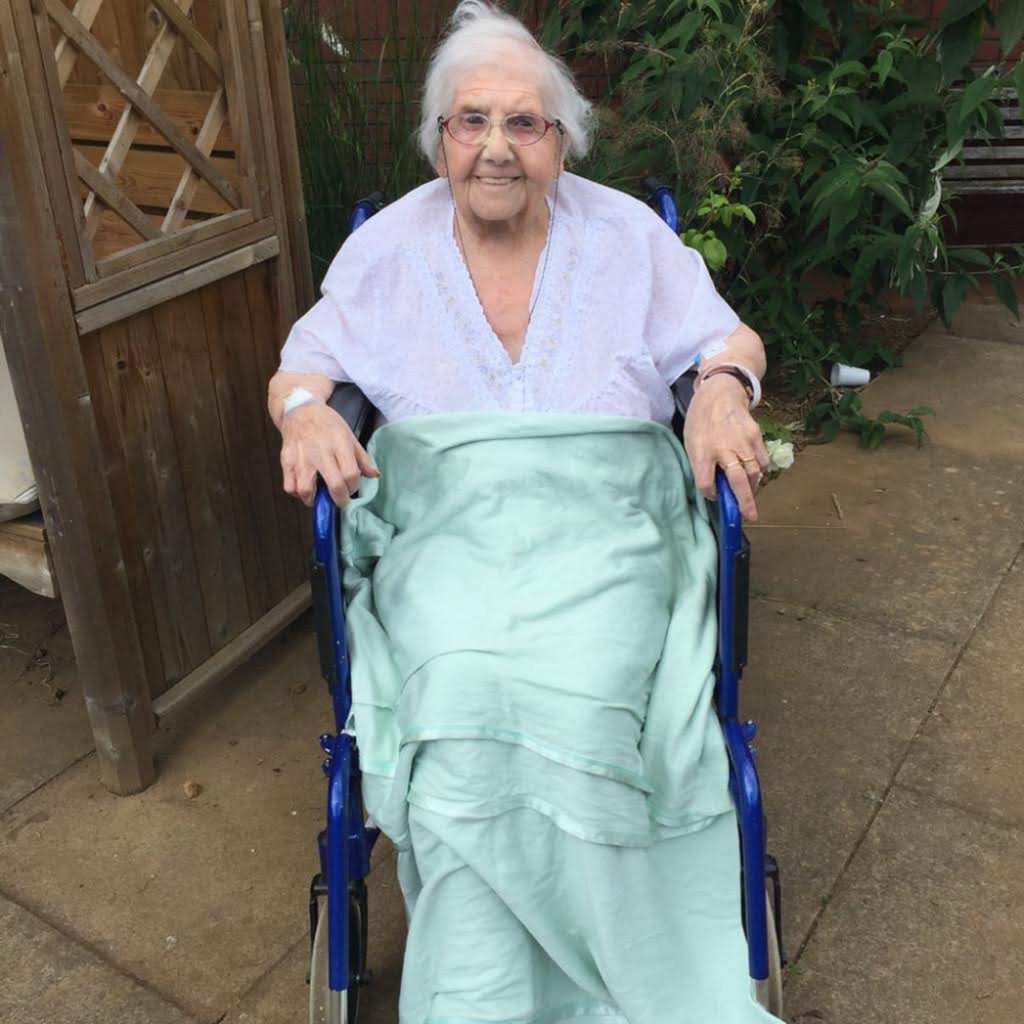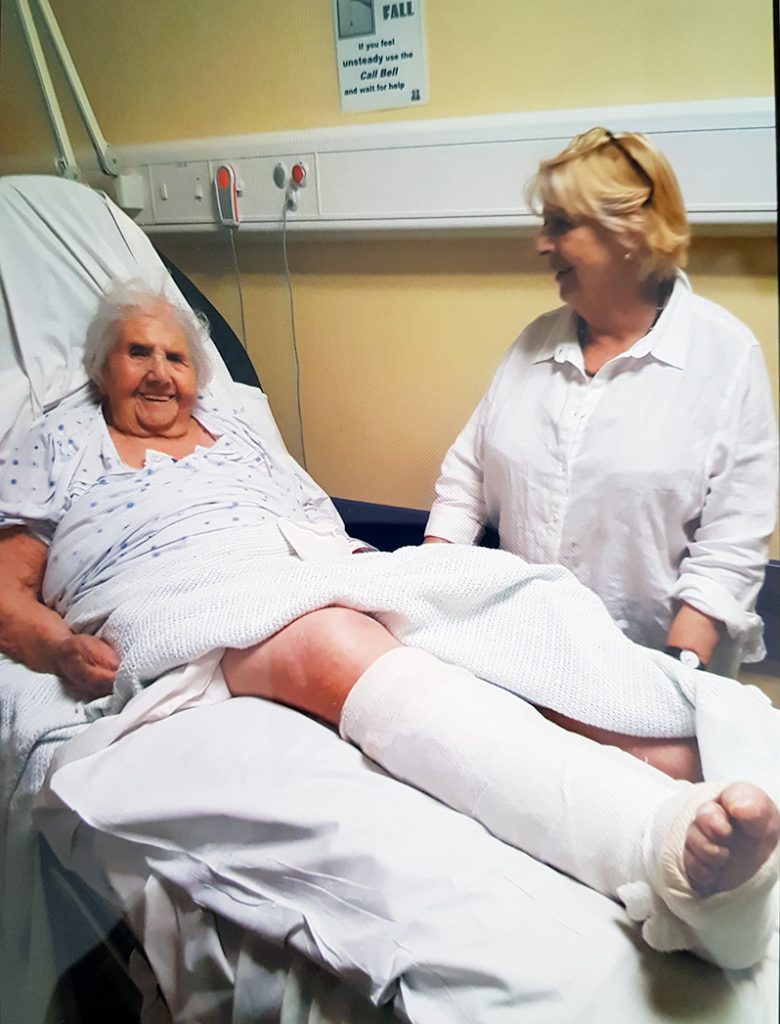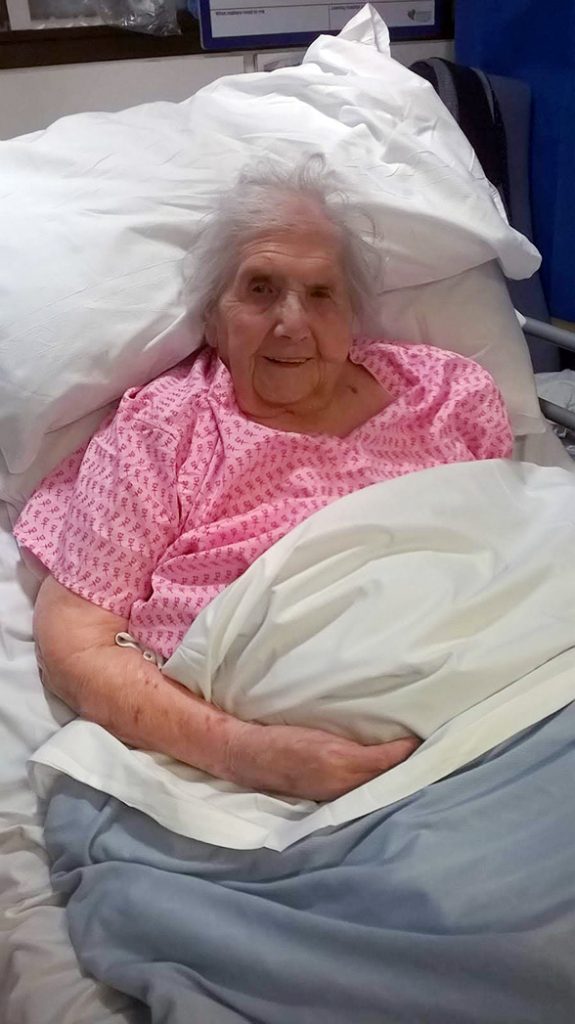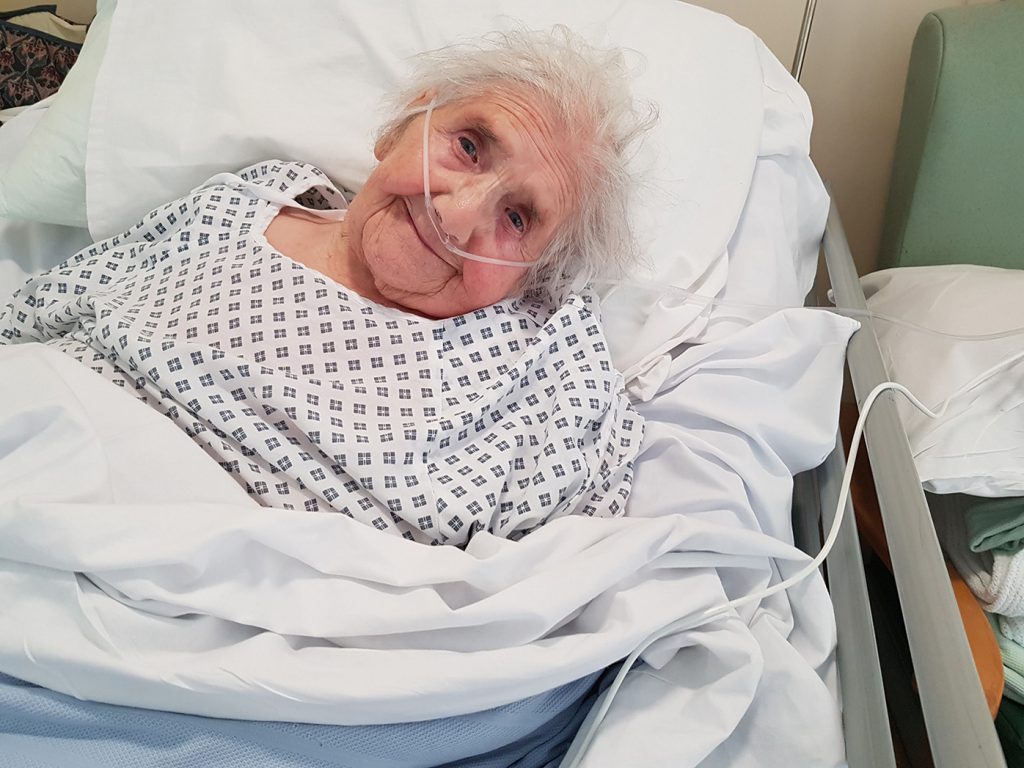Right at the end…

In the middle of October, nearly six months ago, my mother Florence died aged 105 years. It was not ‘somewhere towards the end’ as Diana Athill calls it in her wonderful book of that name but right at the end.
I did not expect to be hit very hard as I had been anticipating it for such a long time. I had always thought ‘when my mum dies I will refuse to be too sad about it’. I wanted to celebrate her long and fairly charmed life. I wanted to think about all the stuff she’s lived through both personal and in the wider world. How amazingly she has come through everything, changing with the times in ways that are quite phenomenal. I wanted to believe that once you really accept that life comes to an end for each and every one of us, which I do (I think), then you cannot be too sad even about the death of your mother when she has lived to be 105 years old. Most of that did turn out to be true. I could celebrate but I was of course sad as well.
Florence has obviously been there all my life. Often she’s been very much in the background, but sometimes right in the foreground. She’s been particularly in the foreground of mine and my family’s lives over the past few years, as she’s needed so much more help. One of my nieces whose father died not long ago and at a very much younger age than Florence said “ It’s the goneness that’s so difficult to come to terms with” and that’s it really. I suddenly think I should be phoning my mum – but she’s not there, she’s gone.
My relationship with Florence had changed so much over the past eight years that she lived in sheltered accommodation at the Court. It was lovely particularly in the first six or seven years she was there, to see her more content and happier. This in turn made it easier for me to visit her. In the past I had slightly dreaded going back to my old home to see my mother growing increasingly more unhappy and sad. Her world was of course becoming narrower though she didn’t seem to find that too difficult. But she was a long way away from family, her house was unsuitable, she had very limited help and many good friends and neighbours had died.
I had thought that she needed to relocate to a care home and have 24 hour care as she was coming up to being 97 years old But my brother and sister wanted her to move nearer to all of us and still have her own place. This was what eventually happened and it turned out to be the right thing to do given her incredible longevity. She lived relatively independently for a number of years in her new ‘sheltered housing’ I’m calling the Court, where she was so much more content. I felt I got to know Florence more as a person rather than just as my mother. I enjoyed her company and I admired the way she dealt with getting so old. I feel privileged to have shared a relatively relaxed, easy going time with her.
On my home computer, I have photos of family and friends on a loop. They pop up when my computer is on but not being used. Quite a few of the photos are of course of Florence. And for quite a few months after she died, I just didn’t like it much when I walked into the room and there was Florence on the screen. I looked away and almost pretended I hadn’t seen them. But a few weeks ago I walked into my work room in the morning and there she was large as life in the middle of my screen, smiling. I said ‘Good morning mum’ and smiled at the screen and I said to myself – ‘ooh that’s better’.
It’s been improving ever since and now six months or so after she died I feel I can start some writing again. Perhaps I’ll do a few more Florence stories and move on to something else, I am not sure what yet.
The story of my mother’s last months in 2019 started really near the beginning of that year. In the year or so before, she had been becoming much more physically and mentally frail, but things came to a head in January and February 2019.
At this time, the management of the company that ran the sheltered accommodation where she lived had felt unable to continue providing her extra daily care, for bathing, getting up, bedtime etc which they had been providing for some years. We understood and appreciated this. Florence’s needs had gone up enormously. She was still able to communicate reasonably well, but she slept in her armchair for long periods of time, was unable to do anything much for herself and she was increasingly forgetful and sometimes confused. The Court offered sheltered accommodation but it was not a care home. There weren’t enough staff to cover Florence’s needs. They, we the family and the local authority who paid for Florence’s daily care needs, agreed that having got to almost 105 years of age, moving again would be awful for her. She herself was adamant this was not what she wanted. So we began the search for a care organisation that could provide more care for her. The Local Authority no longer employed many, if any care workers themselves. Privatisation was the name of the game.
The local authority social workers and finance staff were helpful. They had paid for Florence’s care carried out by the Court carers, since she had moved there. They now reassessed her as needing a real hike in the financing of her care provision. There followed much administrative debate, assessments, filling in of forms and letter writing. We had always organised and managed her care ourselves, preferring the in-house care staff to Local Authority managed care for continuities sake. So, with the high level of care Florence now needed, we ourselves had to find a private care firm. Hence the full dilemma of finding suitable care provision for a very frail elderly person at home hit us.
Managing Florence’s care as well as being with her as much as we could, had over the past few years taken up a great deal of our family’s time. But this phase was both qualitatively and quantitatively different. She needed practically 24hour care or at least looking in on and feeding, toileting etc every few hours in her own home.
We began by setting up a home hospice care arrangement for Florence with the General Practitioner and District Nurse services for when the eventual end of her life at home might happen. Florence was involved throughout the process which she seemed to quite enjoy and they produced an end of life plan with her, though I don’t think they called it that. It was mainly just TLC tender loving care. The DN began visiting weekly which was very helpful and she liked that. The new care regime itself proved much more difficult to put in place and caused much stress all round.
Eventually we did find a suitable care company but they could not cover all of Florence’s care and some extra help in the evenings was found from a family friend to cover the gaps.
It was harder and much more stressful to manage the care once it was not ‘in-house’. My sister and I who both live several journey hours by train and bus away from Florence, visited regularly as did other members of the family who lived nearer. My sister stayed over quite regularly at weekends. But Florence inevitably became more anxious and confused as she became more frail and as her care regime had to change so fundamentally. As ever she did try to face the new challenges with grace and acceptance, though It was funny to see the occasional glare she gave to those of her new group of carers who treated her in a kindly but slightly infantile manner. That was still something Florence was not up for. All of her carers over the past eight years at the Court partly, but not only due to her own preference have been women. Some of them have been more on the ball than others, some have had more experience than others. But to be there with any of these women helping my mother was to realise just how skilled they were at dealing with both the physical and the emotional needs of elderly people. They deserve so much more respect, admiration and renumeration than they currently get.
The new care regime did not last very long. It had been in place about six weeks and she was deteriorating. She had some good days when she had relatively few problems getting up, walking to the bathroom and to her arm chair, all with her carers of course. Other days were very hard it could take half an hour to make the small journey from bed to bathroom or bathroom to chair. She didn’t want to use her folding wheelchair. My sister and I and other members of the family were visiting as often as we and they could. Everyone was great. As were the staff from the Court, they would slip in and see her whenever they had a spare moment, to chivvy her along and reassure her.
She made it to her 105th birthday which was good for her and for everyone. The party which I’ve talked about in an earlier story was held in the sitting room of the Court. Family and a few friends and residents came along. She had always been a party girl but this time she was a lot more detached and not as enthusiastic as usual. But she still tried to engage with people as they came over and talked with her and she seemed to still take some enjoyment from the feeling of sitting in her chair with a glass of wine in her hand from which she took a very occasional sip.
Three weeks after the party I had a phone call from her evening carer to say she had found her sitting on the floor leaning against the hall wall. It seemed she had tried to go to the bathroom on her own. This had happened a week before her birthday as well and like the first time, she seemed relatively alright this time too. The carer had contacted the downstairs duty manager to help get Florence to the loo and to bed. She was a bit wobbly but after a cup of tea and a long chat she was alright and went to sleep. We all knew, as I think to a certain extent she did too, that keeping her at home entailed a degree of risk which on balance we had all agreed was worth taking.
Next morning 27th June I had an earlyish phone call. The Court duty manager, district nurse and emergency ambulance people were all present in her bedroom. Her leg had swollen badly at the ankle and was very bruised. The manager and district nurse assured me she had to go to hospital they thought it could be broken. They wanted my permission to take her. Florence herself was having a cup of tea and was relatively cheerful when I spoke with her. I was shocked and upset. I was sure that if she went into hospital she would never come out again and that had not been the plan. I had had to promise her when we made the home hospice care arrangements that we would not let her be taken into hospital. It was the one thing she had been adamant about. I had thought at the time about nuancing it by saying ‘well mum only in exceptional circumstances’ but it was so clearly not going to satisfy her that I had ducked out on that one and made the full on ‘no hospital’ promise just a few months back.
I argued on the phone with the manager, with the district nurse and then with the ambulance driver who informed me there was no way he was prepared to leave her there. I spoke again with Florence. She did not sound overly upset or perturbed, she said she didn’t want to go into hospital and she was not in much pain, but they were telling her she had to go. So, I relented and they took her to hospital, neither she nor I really had any choice. It was the one time I really cried after that phone call.
I phoned my sister who was quickly on the case and could be at the hospital in a couple of hours. I phoned my sister in law and she contacted my niece, her daughter who lived relatively nearby. She made it to the hospital just a short time after the arrival of the ambulance with Florence in it. Florence was X-rayed and found to have two small fractures of her lower leg. She had a plaster put on in the Accident and Emergency department and was admitted onto a surgical ward of the hospital.
Florence was on the surgical ward for about ten days. She was doing relatively well. She was sleeping a lot in the night and day, which she had been doing for a long while anyway. She was eating well and was sometimes quite perky when awake and was seemingly aware of things going on around her. She was visited by various professionals and it was decided that once she was out of the plaster she would be assessed and if able enough she would be put on to a rehabilitation programme to get moving again. My sister stayed at Florence’s flat and was with her most days. I did try to talk to Florence about the ‘no hospital’ promise, but I quickly realised as I started talking about it that she didn’t seem to remember those talks or she chose not to.
After ten days and with the plaster still on. Florence was moved to a nearby elderly persons care home with a specialist ward for people needing nursing care. She then went rapidly downhill. She became much more unresponsive and was readmitted to hospital. She had had what I think was a panic attack while being put back to bed with the help of carers, via a mechanical pully. In the Accident and Emergency room this time she was put on oxygen and a saline drip. So much for just TLC as the end of life plan! She was in the hospital for about three weeks this time on a ward for elderly people. She seemed comfortable and the doctors and nurses were attentive but she began to sleep more and more. She stopped feeding herself and had to be fed. At first she opened her mouth like a little bird when she was told that food was on offer, even as she lay or sat there with her eyes shut. She was particularly partial to rice pudding and ice cream at this time.
But she was significantly weaker. Eventually she was re assessed by the physiotherapy team and deemed to be unsuitable for rehab and in need of 24hour care. She had a catch phrase, first pointed out by one of her granddaughters, which she used whenever she was woken by a nurse or a doctor or even one of the family. You might say ‘hello Florence/mum/Mrs B, how are you today?’ and the answer was always the same ‘I’m alright thank you’ she would say. She rarely complained or seemed to feel pain or much discomfort which was certainly a blessing.
After much discussion and administrative comings and goings, many forms filled in and phone calls made, Florence was admitted to a second, very comfortable care home. It was the only one nearby with a place available, we were very lucky. It had become clear, though not easy to accept, that this would be Florence’s final home. The financial arrangements for her stay and care proved to be complicated. For the first few weeks she was paid for fully by the NHS. During this time she was assessed and found not to meet the criteria for NHS Continuing Health Care funding as her health and medical needs were deemed not severe enough. It seemed rather odd as although age could not normally be considered, she was nevertheless 105. She also had unmended leg fractures, she could not feed or do anything for herself and was quite unaware of what was happening around her for most of the time. She was assessed as having some nursing care needs and hence provided with some financial support, plus she had some money towards her care still coming from the local authority. But even this plus all of her pension and pension credit did not cover her costs. It was suggested that either the family should pay the remaining sum or she could be moved to a cheaper home. This latter was obviously ridiculous so we paid as requested. The various appeals that we made to try and change the decision were ongoing when Florence died.
While in the home Florence had her final leg plaster removed and although she was unable to stand or even to sit up unaided she had a snazzy arm chair on wheels and was taken into the sitting room on most days and into the dining room to be fed with her lunch. My sister, and one of her carers took her into the garden for fresh air whenever possible. My brother and his family visited whenever they were able and plied her with cake and a little whisky both of which she enjoyed. She was sometimes able to smile and communicate though very minimally really. She had what we called ‘good days and bad days’ but the good days got fewer.
There were a few lovely moments. One of these was a day when I and later my brother arrived to see her and she was sitting in the living room in her armchair watching the communal TV. There was just her and another elderly man who was fast asleep. She was watching a Fred Astaire film. She was awake and had a smile on her face. She watched the film throughout and it was delightful to see her enchantment with it. But although we tried to rekindle the experience it didn’t happen again. On another occasion I was sitting with her in the living room as she slept in her chair when one of the nurses came around with the drinks trolley, it was a treat on a Friday and Sunday afternoon. The nurse was a pleasant, good looking young man who looked after Florence regularly. He got down beside her, gently took her hand to wake her and said ‘Florence would you like a whisky?’. She woke with a start, looking anxious. Then she saw the young man kneeling at the side of her and her face broke into a beaming smile, he repeated his whisky question and she said ‘Ooh yes please just a little one’. I hadn’t seen her smile like that in many weeks, it was wonderful and very funny.
But in the main Florence continued to decline and while she was well looked after there for a few months, she sadly faded away and died very peacefully early one morning.
Florence had been a small child at the start of the 1918 flu pandemic. She had also worked when she was young as what she called a ‘fever nurse’ in a ‘fever hospital’ of which there were then many. In other words she looked after people with severe infectious diseases which, particularly in the early 1930s when she was nursing were illnesses such as scarlet fever, diphtheria and tuberculosis. She also died of course, only a few months before the Covid19 pandemic began.
A few weeks ago I heard on the radio a short heartwarming talk by the writer Howard Jacobson about the life and recent death in May this year of his own very elderly mother. He ended by wondering if his mother although very poorly had seen the corona virus lurking and in his words had ‘made a run for it while she could’.
I wondered if, in Florence’s old wisdom and with all her experience of infectious diseases, she too some months earlier had sensed what was heading towards us and done the same. Probably not, but the thought makes me smile.


